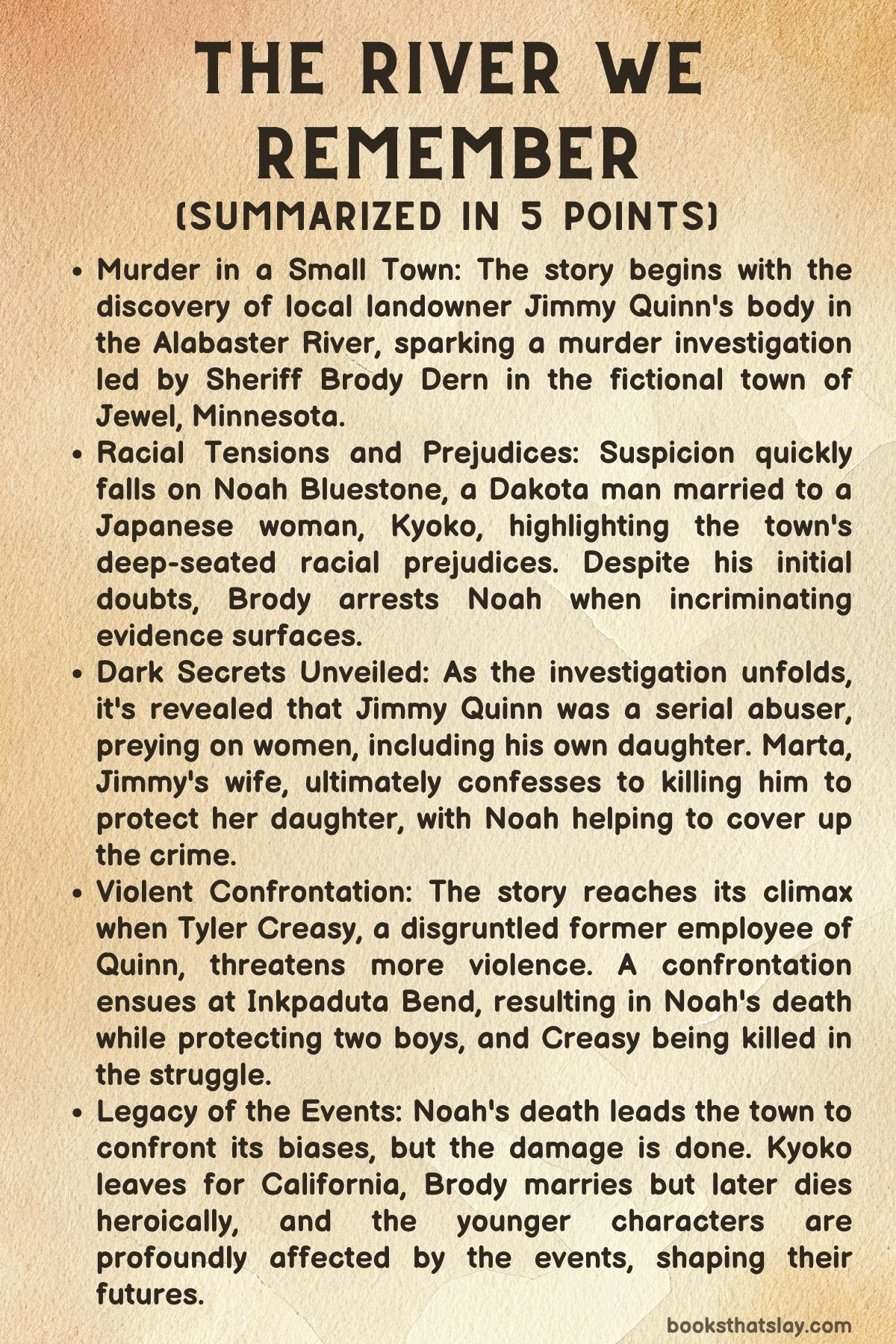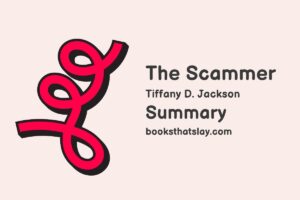The River We Remember Summary, Characters and Themes
The River We Remember is a novel by American author William Kent Krueger, known for his deep explorations of small-town life and human nature. Set in the fictional town of Jewel, Minnesota, the story unfolds in the late 1950s, intertwining themes of justice, prejudice, and redemption.
When a local land baron is found dead, the seemingly idyllic community is torn apart by suspicion and long-buried secrets. Through a gripping murder investigation, Krueger delves into the complexities of guilt and innocence, forcing the characters—and the readers—to confront uncomfortable truths about morality and the human condition.
Summary
In the quiet town of Jewel, Minnesota, the year is 1958, and Memorial Day begins with a shocking discovery: the body of Jimmy Quinn, a local tycoon known for his ruthless ways, is found in the Alabaster River. Sheriff Brody Dern, tasked with the investigation, soon learns that Quinn was killed by a shotgun blast to the chest before being partially eaten by catfish.
Despite his personal disdain for Quinn, Brody starts a murder investigation, but his own conscience is murky—he quietly tampered with the crime scene, wiping away fingerprints, feeling that Quinn might have deserved his fate.
Quinn was widely disliked, but in the close-knit town, he was still “one of them.” Suspicion quickly falls on Noah Bluestone, a Dakota man who had recently been fired by Quinn. With his Japanese wife, Kyoko, Noah faces the town’s simmering racial prejudices. Brody, despite his own uncertainties, is hesitant to believe Noah could be the killer.
However, when a bloody tarp is discovered on Noah’s property, and it’s revealed that Quinn had assaulted Kyoko, Brody begins to wonder if Noah acted to protect his wife.
The town’s prejudices bubble to the surface during a discussion at the Prairie Blooms book club, where members debate the lack of rites of passage for young men.
The conversation drifts to Noah’s possible guilt, with some arguing that his Indigenous heritage and the historical theft of his ancestors’ land provide a motive. Brody defends Noah, but the evidence seems damning, and Noah is soon arrested.
Noah refuses to defend himself or seek legal help, but local lawyer Charlie Bauer takes on his case. As Charlie digs deeper, he uncovers a darker side of Jimmy Quinn. Not only had Quinn abused Kyoko, but he had also preyed on other women, including his own daughter, Fiona.
The truth begins to unravel: Jimmy’s death wasn’t about Kyoko, but about protecting his youngest daughter, Colleen, from his predatory advances. Marta, Jimmy’s current wife and former lover of Noah, shot Jimmy to save Colleen, with Noah helping her cover it up.
Marta, terminally ill, intended to take the blame posthumously, ensuring Noah’s release after her death.
As the investigation reaches its climax, Tyler Creasy, a disgruntled former employee of Quinn, ignites further chaos.
Creasy, guilty of stealing the gasoline Noah was blamed for, rapes Kyoko and threatens Marta’s family, setting their barn on fire. In a confrontation at Inkpaduta Bend, Noah, Del (Creasy’s stepson), and Scott (Del’s friend) find Creasy before Brody can. Noah sacrifices himself to protect the boys, and in the struggle, Scott kills Creasy.
Noah’s death prompts the town to reevaluate their biases, but it’s too late for Kyoko, who leaves for California.
The town moves forward: Brody marries Scott’s mother, but later dies heroically; Del joins the military, only to die in Vietnam; and Scott becomes an attorney in Minneapolis, forever shaped by the events in Jewel.

Characters
Brody Dern
Brody Dern is the central character and the sheriff of the fictional town of Jewel, Minnesota. A World War II veteran, Brody is deeply scarred by his experiences during the war, which shape his personality and actions throughout the novel.
He is portrayed as a man of principle, yet his moral compass is complex and often contradictory. For instance, despite his role as the town’s lawman, Brody manipulates the investigation of Jimmy Quinn’s murder by tampering with evidence, driven by his belief that the murder was justified due to Jimmy’s abusive nature.
His affair with his brother’s wife, Garnet, further complicates his character, revealing his vulnerability and moral conflict. Brody’s internal struggles with guilt, loyalty, and justice are central to the narrative, making him a deeply flawed yet compelling character.
His journey throughout the novel is marked by his attempt to reconcile his sense of duty with his personal demons, ultimately leading him to tragic heroism as he sacrifices himself to save his brother.
Noah Bluestone
Noah Bluestone, a Dakota man, is a pivotal character whose life is marred by the intersection of racial prejudice and personal tragedy. He is a man of few words, embodying the stoicism often ascribed to Indigenous characters in literature.
Noah’s relationship with his wife, Kyoko, who is Japanese, exposes the deep-seated racism within the town of Jewel. Despite being wrongfully accused of Jimmy Quinn’s murder, Noah refuses to defend himself, possibly out of a sense of fatalism or a desire to protect those he loves.
His past relationship with Marta Quinn, which produced a child, adds layers to his character, revealing a man who has loved and lost and who continues to be entangled in the complex web of relationships and secrets in the town.
Noah’s death is a turning point in the novel, symbolizing both the ultimate sacrifice and the tragic cost of prejudice. His character is a poignant commentary on the systemic injustices faced by marginalized communities.
Jimmy Quinn
Jimmy Quinn, the murder victim, is depicted as a deeply flawed and unlikable character. A land baron in Jewel, Jimmy is known for his greed, quick temper, and abusive behavior, particularly towards women.
His death, while the catalyst for the novel’s events, also unearths the dark secrets he harbored, including his history of sexual violence. Jimmy’s relationships with the women in his life, particularly his daughter Fiona and his wife Marta, reveal the extent of his cruelty and the long-lasting impact of his actions.
Although dead for most of the novel, Jimmy’s presence looms large as the characters grapple with the repercussions of his life and death. His murder, initially shrouded in mystery, ultimately exposes the moral decay in the town and the destructive power of unchecked male dominance.
Kyoko Bluestone
Kyoko Bluestone, Noah’s wife, is a character who endures tremendous suffering due to her race and gender. As a Japanese woman in post-World War II America, Kyoko faces not only the pervasive racism of the time but also the trauma of sexual violence at the hands of Tyler Creasy.
Her marriage to Noah, a Dakota man, places her at the intersection of multiple prejudices, making her an outsider in the town of Jewel. Despite these challenges, Kyoko is portrayed as a resilient and dignified character who ultimately decides to leave the town that has brought her so much pain.
Her departure for California symbolizes both a break from the past and a search for a place where she can heal and find peace. Kyoko’s character highlights the intersectionality of racial and gender-based oppression, and her decision to leave Jewel underscores her agency and desire for self-preservation.
Marta Quinn
Marta Quinn is a tragic figure whose life is marked by suffering and sacrifice. As Jimmy Quinn’s wife, she endures years of abuse, yet her primary concern remains the safety of her daughter, Colleen.
Marta’s decision to kill Jimmy to protect Colleen from his sexual advances is an act of desperation and maternal love. Her relationship with Noah, which produced a child, adds another layer of complexity to her character, as it connects her to the broader themes of love, betrayal, and survival that run through the novel.
Marta’s illness and her plan to take the fall for Jimmy’s murder reveal her deep sense of responsibility and guilt, as well as her desire to shield her daughter from further harm. Her character is a study in the quiet strength and enduring pain of women who are often forced into impossible choices to protect those they love.
Charlie Bauer
Charlie Bauer, the semi-retired attorney who takes on Noah’s case, is a character who represents the pursuit of justice in a deeply flawed system. Despite his age and semi-retirement, Charlie is determined to uncover the truth behind Jimmy Quinn’s murder.
His relationship with Brody and his interactions with other town residents demonstrate his moral clarity and commitment to fairness, even in the face of overwhelming prejudice. Charlie’s investigation into Jimmy’s past and his advocacy for Noah make him a key figure in unraveling the novel’s central mystery.
His work ultimately helps to expose the town’s deep-seated racism and the systemic failures that allowed it to fester. Charlie’s character embodies the ideal of the principled lawyer, fighting against the odds to bring justice to those who are wronged.
Tyler Creasy
Tyler Creasy is a villainous character whose actions further illustrate the pervasive violence and cruelty in the town of Jewel. As the true thief of the gasoline for which Noah was fired, and later as a rapist, Creasy embodies the worst aspects of human nature.
His attack on Kyoko and his threats against Marta’s family make him a menacing presence in the novel. Creasy’s violent end at the hands of Scott, while in defense of Noah, serves as a form of rough justice, though it comes at a great cost.
His character is a stark reminder of the dangers posed by unchecked aggression and the consequences of a community that turns a blind eye to such behavior.
Scott and Del
Scott and Del, two young men from Jewel, represent the next generation of the town’s residents. Their actions in the novel are influenced by the trauma and violence that have shaped their community.
Del’s desire to seek revenge against his stepfather, Tyler Creasy, for his domestic violence, and Scott’s involvement in the final confrontation with Creasy, illustrate the ways in which violence begets violence.
Del’s later death in Vietnam and Scott’s decision to become an attorney in Minneapolis suggest different paths taken by those who grow up in such an environment. While Del’s life ends tragically, Scott’s choice to pursue a career in law indicates a desire to bring about change, perhaps as a response to the injustices he witnessed in his youth.
Their characters underscore the novel’s themes of coming of age in a violent world and the struggle to break free from a cycle of brutality.
Garnet Dern
Garnet Dern, Brody’s sister-in-law and lover, adds another layer of complexity to Brody’s character and the novel’s exploration of loyalty and betrayal. Her affair with Brody, which began after his return from the war, complicates her relationship with her husband, Brody’s brother.
Garnet’s character, while not as central to the main plot, contributes to the novel’s exploration of the hidden lives and secrets that pervade the town of Jewel. Her actions reflect the novel’s broader themes of love, guilt, and the often-destructive consequences of secret passions.
Angie
Angie, the proprietress of the local Wagon Wheel Café and later Brody’s wife, is a minor but significant character in the novel. Her relationship with Brody develops over the course of the story, providing him with a sense of stability and normalcy amidst the chaos of the murder investigation.
Angie represents the possibility of redemption and a new beginning for Brody, though their happiness is ultimately short-lived. Her character, while not deeply explored, serves as a counterpoint to the darker elements of the novel, embodying the resilience and enduring hope of the town’s residents.
Themes
Prejudice and Racism
One of the central themes in The River We Remember is the deep-seated prejudice and racism that permeate the small town of Jewel, Minnesota. The novel explores how ingrained biases against both Indigenous people and Japanese Americans affect the lives of Noah and Kyoko Bluestone.
Despite Noah’s innocence, he is quickly suspected of murder simply because of his Dakota heritage. The town’s prejudices are further compounded by Kyoko’s Japanese ancestry, as lingering postwar anti-Japanese sentiments intertwine with existing anti-Indigenous prejudices.
This theme highlights how racism can corrupt justice and divide communities, leading to wrongful accusations and social ostracism.
Justice and Moral Ambiguity
Justice in the novel is portrayed as a complex and often ambiguous concept. Sheriff Brody Dern’s decision to tamper with the crime scene to protect the true perpetrator reflects the moral ambiguity surrounding justice in the story.
Brody’s actions suggest that sometimes the law does not align with what is morally right, particularly when the victim, Jimmy Quinn, is a man of questionable character. The novel raises questions about whether justice is served when the guilty party is protected, even if their actions were motivated by a desire to protect others.
The novel also explores the idea of vigilante justice, as various characters take the law into their own hands in response to the town’s systemic injustices.
The Legacy of War and Trauma
The impact of World War II on the characters, particularly the men of Jewel, is another significant theme. The novel delves into the trauma experienced by veterans like Brody, who struggle with the psychological scars of war.
The lack of formal coming-of-age rites for young white men is discussed in the Prairie Blooms book club, with war being presented as the brutal means by which many men in the town were forced into adulthood. The novel contrasts this with Indigenous rites of passage, suggesting that the absence of such rituals in the broader society has left a void that war has tragically filled.
The lasting effects of war, including PTSD and the difficulty of reintegrating into civilian life, are depicted as shaping the identities and moral choices of the characters.
Gender and Power Dynamics
Gender dynamics play a crucial role in the narrative, particularly in the depiction of Jimmy Quinn’s predatory behavior. The novel reveals the systemic abuse of women, with Jimmy’s violent treatment of his daughter Fiona and his attempted assault on his younger daughter Colleen serving as critical plot points.
These acts of violence highlight the powerlessness of women in the face of male dominance and the societal structures that enable such abuse to go unchecked. Marta’s decision to kill Jimmy to protect her daughter is a powerful commentary on the lengths to which women must go to defend themselves and their children in a patriarchal society.
The novel also explores the intersection of gender and race, as Kyoko’s experiences of violence are compounded by her marginalized status as both a woman and a person of color.
Community and Isolation
The theme of community versus isolation is evident throughout the novel. The town of Jewel is portrayed as a close-knit community, yet one that is fractured by prejudice and fear of the other.
Characters like Noah and Kyoko Bluestone, who are on the margins of this community, experience profound isolation due to their racial backgrounds. The novel shows how this isolation can lead to tragic outcomes, as seen in Noah’s willingness to sacrifice himself for the community that has rejected him.
However, the story also suggests that community can be a source of strength and redemption, as the townspeople ultimately confront their prejudices and rally around Kyoko after Noah’s death. The novel thus explores the dual nature of community as both a source of belonging and exclusion, depending on the circumstances.
The Complexity of Family Relationships
Family relationships in The River We Remember are depicted as complex and often fraught with tension. The novel delves into the dysfunctional dynamics within the Quinn family, particularly the abusive relationship between Jimmy and his daughter Fiona, as well as his attempted assault on Colleen.
These relationships illustrate the dark side of familial bonds, where love is intertwined with control, fear, and violence. On the other hand, the bond between Noah and Marta, despite being strained by societal pressures and secrets, ultimately shows a form of love and loyalty that transcends conventional family ties.
Brody’s affair with his brother’s wife, Garnet, further complicates the notion of family, adding layers of guilt and betrayal to the narrative. The novel portrays family as both a source of deep connection and profound conflict, reflecting the complexities of human relationships.


